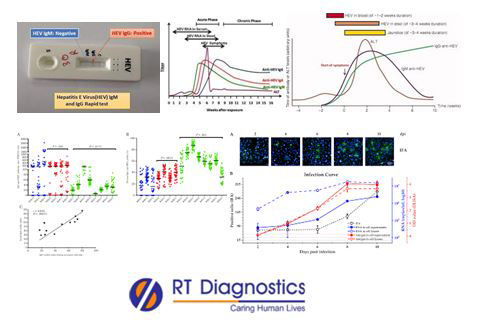HEV IgG Antibody:
Why HEV Antibody (IgG) Test?
CLINICAL INFORMATION
The liver is the most important organ that performs a variety of functions for the normal functioning of the body which includes the synthesis of significant biomolecules such as enzymes, hormones, stores vitamins, sugars and iron to help give the body energy, regulating the metabolites such as cholesterol, clears the metabolic end-products from the blood, synthesis of clotting factors, produces immune factors to combat infections, releases bile for the absorption of fats etc. HEV–Hepatitis E virus is a small, non-enveloped RNA virus. It is generally transferred from an animal reservoir to humans via fecal-oral route. HEV is endemic in certain parts of the world. Hence the infection occurs in patients who travelled to endemic prone areas. HEV causes an acute infection but is usually self-limiting. Causes of HEV usually occur parenterally, and direct person to person transmission is rare. The incidence of clinically severe cases occurs in young to middle-aged adults. Clinical manifestations include bleeding easily, bruising, fatigue, jaundice, dark urine, ascites, edema, poor appetite, weight loss, hepatic encephalopathy (confusion, drowsiness, slurred speech etc), spider angiomas (appearance of spider-like blood vessels on the skin) etc. Chronic untreated cases can lead to complications such as cirrhosis of the liver, liver cancer, liver failure and other extrahepatic complications. HEV IgG Antibody test is performed to help diagnose symptoms in the hepatitis E latent phase of infection. HEV Antibody indicates previous exposure or acute ongoing infection with hepatitis E virus in an undefined timeframe. These IgG antibodies arise shortly after the onset of symptoms of hepatitis E infection exposure or during the onset of vaccination. During this window period, the antibodies are detected on testing and gradually these IgM antibodies disappear following IgG antibodies, which remains as a serological marker even till years after hepatitis E virus exposure. HEV infection can be diagnosed by HEV RNA detection by PCR, anti-HEV antibodies or screening for HEV antigens by ELISA to determine the viral load, immunoassays, immunoblot etc. Other tests include liver function test and liver enzymes to measure potential liver damage (liver inflammation) caused by a hepatitis-E virus (i.e enzyme assays) such as Alanine Amino-Transferase (ALT) elevated during inflammation of the liver, PCR to measure HBV –DNA, fibroscan for transient elastography and Aspartate Amino-Transferase (AST) to platelet ratio for the assessment of liver cirrhosis.

General Instructions:
Sample Requirement: Specimen - Blood sample collected from the vein. Test Preparation: None.
NOTE - Sample for specimen collections may vary based on the patient’s condition/cases according to the patient’s presenting complaints/signs or symptoms:
SPECIMEN REQUIREMENT (Special or Rare Cases) - As instructed and guided by Physician / Clinician / Pathologist / as per Laboratory’s requirements, according to procedures and protocols.
This Multi-Specialty Clinical Referral Laboratory RT DIAGNOSTICS provides precise and accurate tests with an extensive range of testing services to the medical centres to help in the diagnosis and identification of pathology in the test specimens for infectious diseases and also to evaluate the function of organ systems of the patient. It prevents further complications and helps to stabilize and restore health to near normalcy at the earliest without delay.



